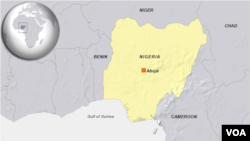Hundreds of people, including women’s rights activists, Nigerian lawmakers, and other participants, chanted as they walked from the National Assembly through the streets of Abuja on Monday.
The rally was part of Nigeria's participation in the United Nations-backed "16 Days of Activism," a campaign against gender-based violence, running from November 25 to December 10.
It also was an opportunity to announce the latest efforts by authorities to address gender-based violence — also referred to as GBV — in Nigeria.
Abbas Tajudeen, Nigeria's speaker of the House of Representatives, led lawmakers to the rally. It took place on the 25th anniversary of the International Day for the Elimination of Violence Against Women.
"Every 10 minutes a woman is being killed across the world. This is an unacceptable trend; this is an unforgivable trend," said Tajudeen. "We in the parliament must have to unite more than ever before with relevant authorities, particularly the law enforcement in ensuring that we cut this dangerous trend to the barest minimum."
Gender-based violence is a global problem. Nigerian authorities say about one-third of women between 15 and 49 experiences physical and sexual assault in their lifetimes.
The country also accounts for approximately 20 million GBV survivors — or about 10% of the global total.
Poor awareness, a low rate of reporting, cultural and religious biases, and trust deficits in the justice system are some of the challenges hampering efforts to address GBV in Nigeria.
Raquel Kasham Daniel is the founder of the non-profit "Beyond the Classroom Foundation," which promotes the rights of girls through education and advocacy.
"I think that policies that protect women and put the perpetrators behind bars will be very helpful," said Daniel, whose foundation is championing the sexual harassment bill in tertiary education. "That will be a very good one to pass, we hope that it gets the presidential assent soon."
Nigeria had previously launched a "sex offenders” registry to name and shame perpetrators of violence against women.
On Monday, Women Affairs Minister Imaan Suleiman-Ibrahim announced the launch of a national electronic dashboard system to improve data collection and accountability.
Suleiman-Ibrahim said that besides preventive measures, authorities will review existing laws to ensure they protect survivors of gender-based violence.
"This occasion provides us yet another opportunity to renew those commitments and take deliberate actions to protect the rights, safety and dignity of women, girls and vulnerable people across Nigeria, said Suleiman-Ibrahim.
As authorities continue to make efforts to address the problem, many hope the new intervention offers a lifeline to millions of vulnerable people. Africa recorded the highest rates of intimate partner and family-related femicide last year, followed by the Americas and Oceania, according to the United Nations’ Office on Drugs and Crime.




